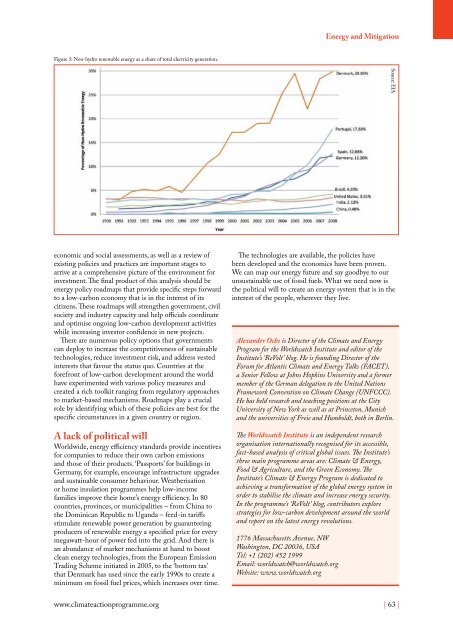Climate Action 2010-2011
Create successful ePaper yourself
Turn your PDF publications into a flip-book with our unique Google optimized e-Paper software.
Energy and Mitigation<br />
Figure 3: Non-hydro renewable energy as a share of total electricity generation.<br />
Source: EIA<br />
economic and social assessments, as well as a review of<br />
existing policies and practices are important stages to<br />
arrive at a comprehensive picture of the environment for<br />
investment. The final product of this analysis should be<br />
energy policy roadmaps that provide specific steps forward<br />
to a low-carbon economy that is in the interest of its<br />
citizens. These roadmaps will strengthen government, civil<br />
society and industry capacity and help officials coordinate<br />
and optimise ongoing low-carbon development activities<br />
while increasing investor confidence in new projects.<br />
There are numerous policy options that governments<br />
can deploy to increase the competitiveness of sustainable<br />
technologies, reduce investment risk, and address vested<br />
interests that favour the status quo. Countries at the<br />
forefront of low-carbon development around the world<br />
have experimented with various policy measures and<br />
created a rich toolkit ranging from regulatory approaches<br />
to market-based mechanisms. Roadmaps play a crucial<br />
role by identifying which of these policies are best for the<br />
specific circumstances in a given country or region.<br />
A lack of political will<br />
Worldwide, energy efficiency standards provide incentives<br />
for companies to reduce their own carbon emissions<br />
and those of their products. ‘Passports’ for buildings in<br />
Germany, for example, encourage infrastructure upgrades<br />
and sustainable consumer behaviour. Weatherisation<br />
or home insulation programmes help low-income<br />
families improve their home’s energy efficiency. In 80<br />
countries, provinces, or municipalities – from China to<br />
the Dominican Republic to Uganda – feed-in tariffs<br />
stimulate renewable power generation by guaranteeing<br />
producers of renewable energy a specified price for every<br />
megawatt-hour of power fed into the grid. And there is<br />
an abundance of market mechanisms at hand to boost<br />
clean energy technologies, from the European Emission<br />
Trading Scheme initiated in 2005, to the ‘bottom tax’<br />
that Denmark has used since the early 1990s to create a<br />
minimum on fossil fuel prices, which increases over time.<br />
The technologies are available, the policies have<br />
been developed and the economics have been proven.<br />
We can map our energy future and say goodbye to our<br />
unsustainable use of fossil fuels. What we need now is<br />
the political will to create an energy system that is in the<br />
interest of the people, wherever they live.<br />
Alexander Ochs is Director of the <strong>Climate</strong> and Energy<br />
Program for the Worldwatch Institute and editor of the<br />
Institute’s ‘ReVolt’ blog. He is founding Director of the<br />
Forum for Atlantic <strong>Climate</strong> and Energy Talks (FACET),<br />
a Senior Fellow at Johns Hopkins University and a former<br />
member of the German delegation to the United Nations<br />
Framework Convention on <strong>Climate</strong> Change (UNFCCC).<br />
He has held research and teaching positions at the City<br />
University of New York as well as at Princeton, Munich<br />
and the universities of Freie and Humboldt, both in Berlin.<br />
The Worldwatch Institute is an independent research<br />
organisation internationally recognised for its accessible,<br />
fact-based analysis of critical global issues. The Institute’s<br />
three main programme areas are: <strong>Climate</strong> & Energy,<br />
Food & Agriculture, and the Green Economy. The<br />
Institute’s <strong>Climate</strong> & Energy Program is dedicated to<br />
achieving a transformation of the global energy system in<br />
order to stabilise the climate and increase energy security.<br />
In the programme’s ‘ReVolt’ blog, contributors explore<br />
strategies for low-carbon development around the world<br />
and report on the latest energy revolutions.<br />
1776 Massachusetts Avenue, NW<br />
Washington, DC 20036, USA<br />
Tel: +1 (202) 452 1999<br />
Email: worldwatch@worldwatch.org<br />
Website: www.worldwatch.org<br />
www.climateactionprogramme.org | 63 |












